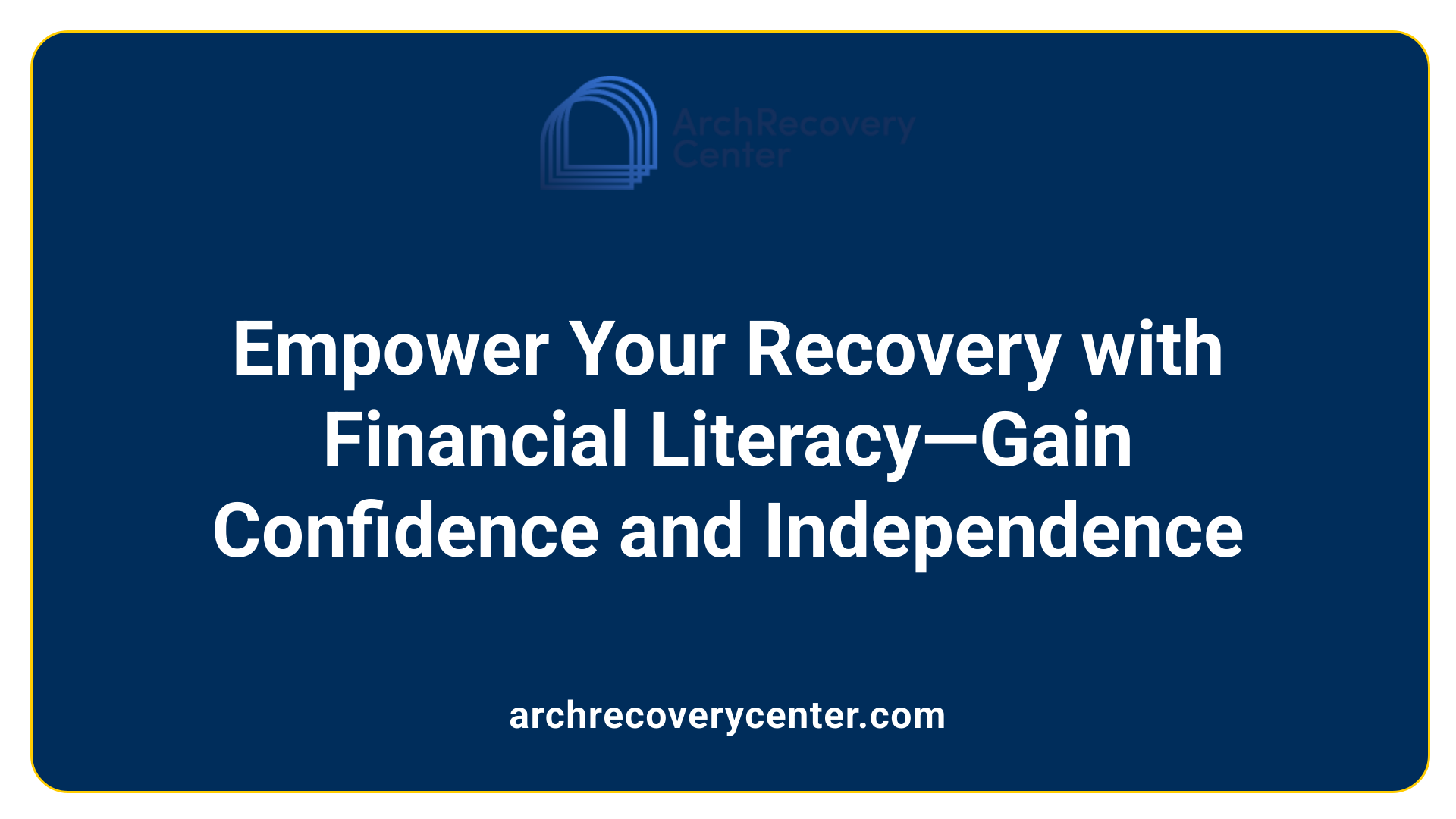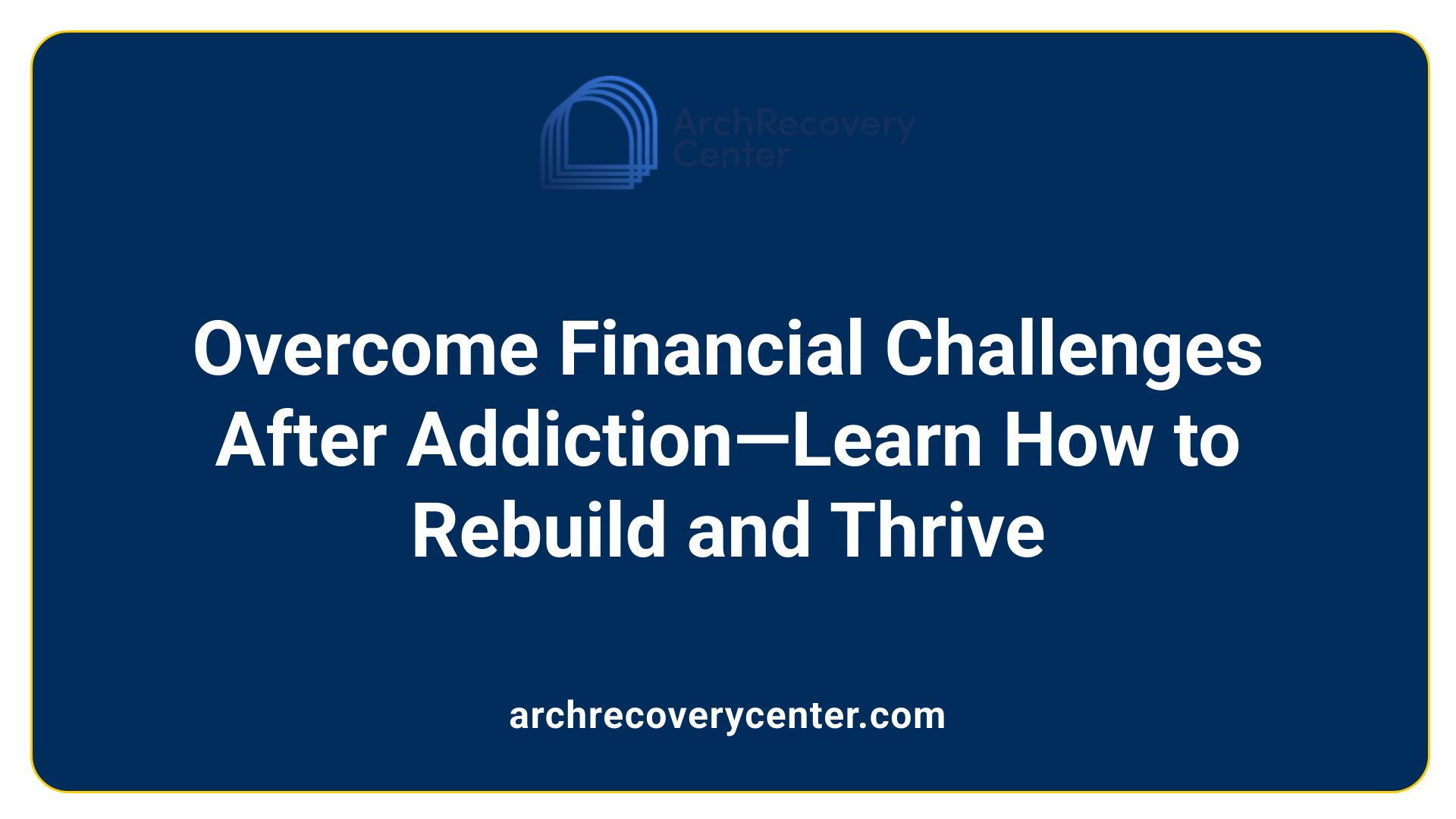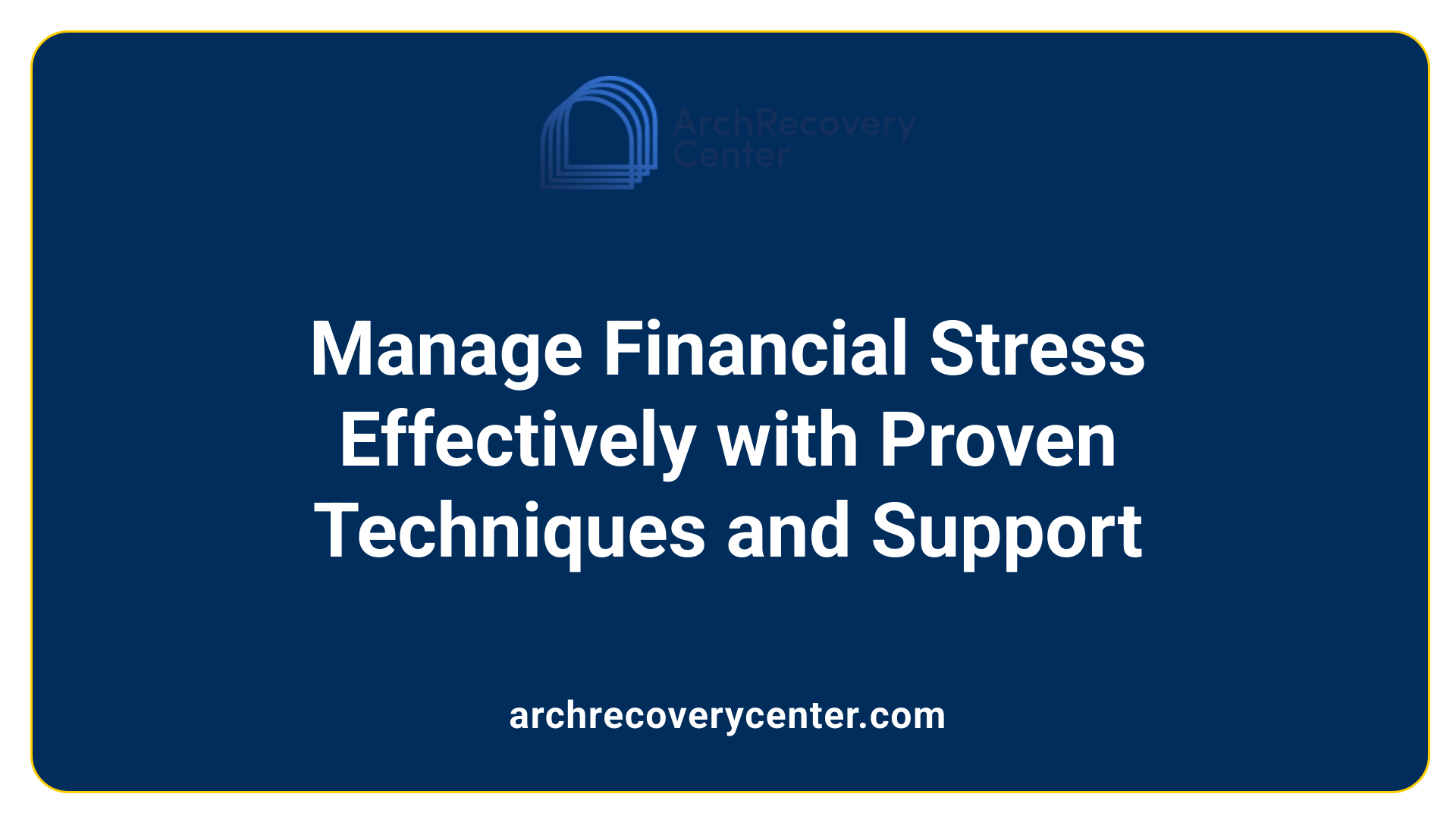How to Manage Financial Stress After Detox

Introduction
When undergoing detox and substance recovery, financial stress often accompanies the emotional and physical challenges faced. Understanding and managing financial health becomes a critical component of the recovery process, as unresolved financial stress can be a significant trigger for relapse. This article will guide you through essential strategies to achieve financial stability during and after detox, providing you with the tools needed to rebuild your financial foundation and reduce anxiety.
Understanding Financial Education's Role in Recovery

Why is financial education important for individuals recovering from addiction?
Financial education is crucial for those on the path to recovery because it helps develop the skills needed to manage money wisely. Managing addiction often leads to financial struggles, including debts, missed bills, and lost income. Learning how to create budgets, prioritize spending, and build savings can significantly reduce stress and prevent relapse.
People in recovery face the challenge of rebuilding their financial stability, which is vital for their overall well-being. With proper financial knowledge, they can avoid common pitfalls like getting caught in high-interest debt or falling for scams. Financial literacy enables individuals to make informed decisions about their money and plan for a secure future.
Resources designed to promote financial education play an essential role. For example, organizations like OneUnited Bank offer tools and services that support financial literacy, such as financial workshops, advisory services, and accessible banking options. These resources help individuals gain confidence in managing their finances.
Furthermore, financial education boosts independence and self-esteem. Feeling in control of one's finances can motivate continued sobriety and foster a sense of achievement. Ultimately, understanding money management is a foundation for long-term stability and supports sustained recovery from addiction.
Rebuilding Financial Health Post-Addiction

How does addiction impact financial health and what steps can be taken to rebuild?
Addiction often leads to serious financial challenges. People may spend large amounts on substances or addictive behaviors, which can drain savings and rack up debts. Additionally, addiction can reduce productivity at work or cause job loss, resulting in decreased income.
This financial strain can cause feelings of stress and helplessness. Mounting bills and dwindling savings make it harder to achieve financial stability. Recognizing the extent of the damage is the first step towards recovery.
To start rebuilding, it’s important to create a realistic budget that reflects current income and expenses. Prioritizing debt repayment, especially high-interest debts, can help reduce financial burdens more quickly.
Building a savings cushion is crucial, even if it means saving small amounts consistently. This provides a safety net for unforeseen expenses and reduces anxiety.
Seeking professional support like financial counseling can be beneficial. Counselors can help develop manageable repayment plans and suggest ways to cut unnecessary spending.
Addressing underlying addiction issues through treatment programs is vital, as financial setbacks often stem from or are compounded by substance dependency.
Patience and long-term discipline are essential. Financial recovery is a gradual process—focused effort and support can help restore stability.
Regularly reviewing financial goals, such as saving for a future or clearing debts, keeps motivation high. Staying committed to these objectives helps in gradually rebuilding financial security.
Ultimately, combining addiction recovery with sound financial planning creates a stronger foundation for a stable, healthier future.
Strategies for Managing Financial Stress
What are effective strategies for managing financial stress after detox or substance recovery?
Managing financial stress following detox or recovery involves several practical steps that help restore stability and peace of mind.
Firstly, creating a detailed budget is essential. This involves listing all sources of income alongside current expenses, including bills, groceries, and debts. Using online tools or apps like Mint can facilitate tracking and managing spending effectively. A well-structured budget helps identify non-essential expenses that can be cut, freeing up money for savings and debt repayment.
Secondly, establishing an emergency fund provides a safety net. Saving a small percentage of income regularly can help cushion unexpected costs such as medical bills or legal expenses. Aim for at least three to six months’ worth of living expenses—a buffer that reduces anxiety and prevents debt accumulation during tough times.
Thirdly, seeking counseling and support can be highly beneficial. Financial counseling services help develop personalized plans for debt management, budgeting, and long-term financial goals. Support groups or professionals also provide emotional encouragement, which is vital during the recovery process.
By combining these strategies—budgeting, building emergency savings, and professional advice—individuals and couples can gradually rebuild their financial health. Patience and consistent effort are critical, as recovering financial footing takes time, but with steady progress, stress diminishes, reinforcing recovery and overall well-being.
This comprehensive approach ensures that financial management becomes part of a holistic recovery plan, strengthening resilience against relapse and ongoing challenges.
Achieving Financial Stability During and After Detox
How can financial stability be achieved during and after detox?
Financial stability is a vital aspect of the recovery journey, helping individuals and couples to reduce stress and focus on health. During detox, creating a structured financial plan plays a crucial role. This involves drafting a comprehensive budget that clearly outlines income, essential expenses like rent, bills, and groceries, while cutting non-essential spending.
Building and maintaining an emergency fund, ideally covering three to six months’ worth of expenses, provides a financial safety net. This reserve helps cushion unforeseen costs such as medical expenses or sudden changes in income, alleviating anxiety.
To stay on track, automating savings and bill payments using digital tools or mobile apps like Mint or budgeting trackers ensures consistency. Automation reduces the chance of missed payments and encourages disciplined saving habits.
Involving partners in financial discussions strengthens emotional support and fosters shared responsibility. Transparent conversations about debts, goals, and financial fears can lead to better planning and prevent misunderstandings.
Post-detox, ongoing financial management involves regular review of the budget, setting achievable goals—such as paying off specific debts or increasing savings—and seeking professional advice if needed. Managing financial stress through practices like mindfulness, relaxation techniques, and maintaining a balanced lifestyle further supports overall recovery and stability.
By adopting these strategies—planning thoroughly, automating savings, communicating openly, and practicing stress mindfulness—individuals and couples can lay the groundwork for a secure financial future during their recovery process.
Guidance on Budgeting and Debt Management Post-Detox
What guidance is there on budgeting and debt management post-detox?
After completing detox, establishing solid financial habits is crucial for long-term recovery and stability. The first step involves thoroughly understanding your current financial situation. This means identifying any existing issues such as high debts, unmanageable expenses, or irregular income.
Creating a detailed personal budget serves as a foundation. List all sources of income, including salary, benefits, or other earnings. Then, categorize your expenses into essentials—such as rent, utilities, and groceries—and discretionary spending like entertainment or dining out.
To promote financial health, focus on reducing unnecessary expenses. Review service packages to find cheaper alternatives, limit impulse buying, and pay in cash when possible. Managing debt responsibly involves prioritizing payments on high-interest debts, consolidating loans if feasible, and negotiating repayment plans with creditors.
Increasing income can also play a vital role in recovery. Consider pursuing overtime opportunities, selling unused or underused items, or exploring part-time or freelance work. Building an emergency fund—aiming to save three to six months’ worth of expenses—provides a safety net for unexpected financial challenges.
Improving your credit score is another priority. Make consistent payments on bills and debts, avoid accumulating new debt, and check your credit report regularly for errors. These steps collectively support stability and reduce stress.
Incorporating these strategies not only helps rebuild financial security but also enhances mental wellbeing, which is essential in recovery from addiction. Online tools and apps like Mint or YNAB can assist in tracking spending, setting goals, and maintaining accountability.
Focusing on sound budgeting and debt management post-detox lays a strong foundation for sustainable living, preventing relapse triggers associated with financial strain.
Coping Techniques for Reducing Financial Anxiety

What coping techniques can reduce financial anxiety after detox?
Financial stress can linger even after completing detox, impacting recovery and overall well-being. To address this, individuals should start by developing a comprehensive financial plan. Setting realistic goals, creating a detailed budget, and tracking expenses regularly helps foster a sense of control over one’s financial situation.
Building an emergency fund is particularly effective in reducing anxiety. Experts recommend saving enough to cover three to six months of living expenses, creating a financial cushion that provides stability during unforeseen circumstances.
Open communication with partners and trusted advisors is crucial. Discussing financial concerns enhances emotional support and ensures shared understanding and planning. Consulting with financial counselors or advisors can provide tailored strategies for managing debts, consolidating loans, and prioritizing spending.
In addition, automating financial tasks simplifies money management. Automatic transfers to savings accounts, rounding up purchases, and using apps designed for budgeting and saving can help maintain healthy financial habits without constant effort or stress.
Complementing these practices with stress management techniques like physical activity, mindfulness meditation, and maintaining healthy routines supports mental resilience. These activities can improve decision-making, reduce emotional reactivity to financial worries, and promote a balanced approach to recovery.
Overall, integrating these coping strategies helps build confidence in managing finances, reduces anxiety, and reinforces the stability necessary for long-term sobriety and well-being.
Available Resources and Support During Recovery
What resources and support options are available for financial challenges during addiction recovery?
Recovering from addiction often involves addressing significant financial challenges. Fortunately, numerous resources and support networks are designed to help individuals manage their financial difficulties and rebuild stability.
Financial counseling services are one of the primary options. These professionals can assist in creating realistic budgets, prioritizing debt repayment, and developing strategies for savings. Many community centers and nonprofit organizations also offer support groups and workshops that focus specifically on financial education, covering topics like managing debts, avoiding new liabilities, and understanding credit scores.
Managing credit is crucial for rebuilding financial health. Checking your credit report regularly allows you to identify and dispute errors or fraudulent activity that could negatively impact your score. Improving credit involves making timely payments, reducing credit utilization, and avoiding unnecessary borrowing.
Supporting programs may also be available through local banks, credit unions, or community organizations, especially in Canada, where tailored assistance programs help those facing financial hardships during recovery. These programs often include low-interest loans, payment plans, or financial literacy workshops.
Educating oneself on what influences credit scores can significantly benefit recovery. Factors like consistent bill payments, low debt-to-income ratios, and responsible credit use contribute to a healthier credit profile over time.
By leveraging these resources, individuals in recovery can reduce financial stress, avoid relapse triggers associated with financial strain, and set a stable foundation for the future.
| Resource Type | Benefits | Additional Details |
|---|---|---|
| Financial Counseling | Personalized debt management, budgeting help | Offered by nonprofits, community services |
| Support Groups | Peer guidance, shared experiences | Local groups, online forums |
| Community Education Programs | Workshops on credit, savings, and financial planning | Usually free or low-cost |
| Credit Report Services | Error detection, credit monitoring | Free annual reports available, dispute assistance |
| Tailored Programs (Canada) | Loan options, financial support, tailored advice | Specific to regional needs |
Taking advantage of available programs not only alleviates immediate financial burdens but also promotes long-term stability. Combining professional guidance with self-education empowers those in recovery to regain control of their finances and stay resilient against future stressors.
Detoxing Your Finances for a Fresh Start
Creating a Spending Plan
A crucial step in detoxing finances involves mapping out all current expenses. Start by gathering bank statements and receipts to understand where your money is going. Categorize these expenses into essentials—such as rent, utilities, groceries, and healthcare—and non-essentials like dining out, entertainment, and shopping. Using budgeting tools or apps like Mint can help track and analyze spending habits.
A structured spending plan ensures you allocate your income wisely, avoiding unnecessary expenditures and focusing on stability. It’s recommended to set aside a portion for savings and debt repayment before covering discretionary items.
Prioritizing Essential Expenses
Identifying and prioritizing essential expenses is vital during a financial detox. These include housing costs, bills, groceries, and basic healthcare. Once essentials are secured, review your debts to formulate an effective repayment schedule.
Temporary avoidance of non-essential spending can illuminate what is truly necessary and help reduce financial stress. Cutting back on luxury expenses temporarily allows you to focus on building a safety net, such as an emergency fund, which can provide security during unforeseen financial hardships.
Benefits of a Financial Detox
Engaging in a financial detox can lead to numerous advantages. It enhances awareness of spending patterns, reduces debts, and increases savings. This process ultimately fosters greater financial security and peace of mind.
Over time, a financial detox can improve your overall quality of life by decreasing financial stress and anxiety. It can also motivate healthier financial behaviors and set the foundation for achieving long-term financial goals, like buying a home, planning for retirement, or building an emergency reserve.
By regularly practicing financial detox methods, such as creating budgets and cutting unnecessary expenses, you can maintain better control over your finances and pave the way for a more stable and fulfilling future.
Long-Term Financial Security and Recovery
Building Savings for the Future
Achieving financial stability after detox and addiction treatment starts with establishing a solid savings plan. An emergency fund, ideally covering three to six months of living expenses, offers a safety net against unforeseen costs and reduces anxiety. Creating a consistent habit of saving—often referred to as 'Pay Yourself First'—ensures that a portion of income is allocated towards future needs before paying bills or expenses. Using budgeting tools and apps can simplify tracking expenses and identifying opportunities to save.
Advancing Career and Promoting Responsible Financial Habits
Long-term recovery often involves improving career prospects, which can lead to increased income and greater financial security. Engaging with local employment agencies, training programs, or apprenticeship opportunities can help individuals re-enter the workforce or advance in their careers.
Practicing responsible financial behavior—such as managing debts wisely, avoiding risky investments, and maintaining good credit—is vital. Regularly reviewing financial goals and progress helps reinforce positive habits and keeps motivation high.
Preventing Relapse through Financial Stability
Financial stress is a common relapse trigger. Maintaining stable income, managing debts effectively, and having a clear financial plan can significantly reduce this risk. Support from financial counselors or addiction specialists can provide ongoing guidance.
Building a resilient financial foundation not only eases day-to-day stress but also reinforces overall recovery. It fosters a sense of control and self-efficacy, which are critical components of long-term sobriety.
| Strategy | Action Steps | Benefits |
|---|---|---|
| Savings | Establish emergency and savings accounts | Financial security and reduced stress |
| Career Growth | Pursue training, new skills, or job opportunities | Increased income and confidence |
| Financial Management | Regularly review debts and create budgets | Better control over expenses and debt reduction |
| Relapse Prevention | Seek ongoing financial advice and support | Sustained recovery and emotional stability |
Conclusion
Financial stability is an integral part of the addiction recovery journey, serving as a foundation for sustained sobriety and overall well-being. By implementing effective financial management strategies, individuals can reduce the anxiety associated with financial stress, ensuring a smoother transition to a healthy, stable life post-detox. With guidance, support, and dedication to financial literacy, it is possible to overcome the financial challenges faced during recovery and build a prosperous, fulfilling future. Remember, financial recovery is a process that requires patience and consistent effort, but the rewards of stability and peace of mind are well worth it.
References
- How to regulate your finances after rehab
- How does detox for couples handle financial stress related to ...
- Financial Recovery After Addiction: Employment and Money ...
- Coping with Financial Stress - HelpGuide.org
- How Does Detox for Couples Handle Financial Stress Related to ...
- 6 Steps to a Financial Detox • How to Spend Money Wisely
- How financial stress impacts your health (and 5 tips to deal) - Calm
- Financial Detox - How to Reset Your Spending Habits - QuidMarket
- Life After Detox: Maintaining Sobriety and Health
Recent articles

The Benefits of Journaling During Recovery from Addiction
April 25, 2025
Unlocking Inner Strength: Harnessing Journaling for Addiction Recovery

How to Develop a Sober Identity
April 25, 2025
The Path to Self-Discovery and Lasting Sobriety

What Happens After You Complete Residential Treatment?
April 25, 2025
Navigating the Path to Lasting Sobriety After Residential Care

The Importance of Medically Supervised Detox for Safe Withdrawal
April 25, 2025
Ensuring Safety and Success in Addiction Recovery

Withdrawal Signs of Gabapentin Addiction
April 25, 2025
Understanding the Risks and Symptoms of Gabapentin Withdrawal

How Addiction Affects Physical Health
April 25, 2025
Unraveling the Hidden Damage: The True Impact of Addiction on the Body

How to Build New Traditions in Recovery
April 25, 2025
Reimagining Holiday Celebrations for Lasting Sobriety

How Nutrition and Wellness Programs Enhance Detoxification
April 24, 2025
Unlocking the Body's Natural Detox Power Through Nutrition and Wellness

Prescription Drug Overdoses on the Rise in Bensalem
April 24, 2025
Bensalem Confronts Escalating Prescription Drug Crisis

The Link Between Fitness and Improved Mental Clarity
April 24, 2025
Unlocking Cognitive Power Through Movement

Creating Healthy Habits in Residential Recovery Programs
April 24, 2025
Building a Foundation for Long-Term Sobriety

Sober Holidays – You Can Do It
April 24, 2025
Celebrating the Season Soberly: Strategies for a Joyful, Alcohol-Free Holiday

What Is Rehab?
April 24, 2025
Understanding the Path to Recovery and Independence

Signs Your Loved One May Need a Detox Program
April 24, 2025
Understanding and Recognizing the Urgent Need for a Detox Program

The Dangers of Fentanyl and the Role of Detox in Saving Lives
April 23, 2025
Confronting the Fentanyl Crisis: From Risks to Recovery

Why Residential Treatment is Ideal for Individuals with Chronic Relapse
April 23, 2025
Breaking the Cycle: The Power of Residential Treatment in Chronic Relapse Recovery

The Role of Peer Support in Addiction Recovery
April 23, 2025
Harnessing Peer Power in the Fight Against Addiction

How to Overcome Procrastination During Sobriety
April 23, 2025
Conquering Delay: Strategies for Staying on Track in Sobriety

How to Handle Conflict in Recovery Environments
April 23, 2025
Building Resilience: Mastering Conflict Management in Recovery Settings

How to Handle Setbacks in Your Recovery Journey After Detox
April 23, 2025
Navigating the Challenges of Sobriety: Overcoming Obstacles Post-Detox

How Prescription Drug Addiction Impacts Relationships and How to Heal
April 23, 2025
Breaking the Silence: Navigating the Complexities of Prescription Drug Addiction in Relationships

Is Your Parent in Need of a Prescription Drug Rehab?
April 22, 2025
Uncovering the Hidden Signs of Prescription Drug Dependency in Seniors

What Does Porn Addiction Look Like
April 22, 2025
Understanding the Hidden Struggles of Porn Addiction

The Role of Empathy and Compassion in Supporting Others' Sobriety
April 22, 2025
Fostering Connection and Healing in Addiction Recovery

Healing Addiction with Emdr Therapy
April 22, 2025
Trauma-Informed Approaches Transform Addiction Recovery

Types of Alcoholics
April 22, 2025
Decoding the Diversity of Alcohol Dependence

How Residential Treatment Supports Individuals with Severe Addiction
April 22, 2025
Comprehensive Support Systems for Severe Addiction Recovery

What Is Codependency?
April 22, 2025
Unraveling the Complex Web of Dependence and Emotional Entanglement

How to Celebrate Milestones in Sobriety
April 22, 2025
Marking the Journey: Celebrating Your Sobriety Milestones

How Residential Treatment Can Help You Overcome the Shame of Addiction
April 22, 2025
Breaking Barriers: The Healing Power of Residential Addiction Treatment

